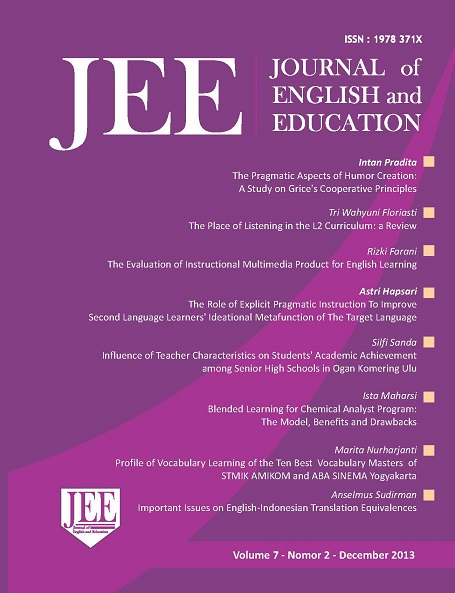Main Article Content
Abstract
In second language research, listening opportunities are often characterized as the linguistics environment – the stage for SLA. This environment, that is, the speakers of the target language and their speech to the L2 learners, provide linguistics input in the form of listening and interaction opportunities embedded in social and pedagogic situations. It has been noted that for a person to learn second language three major conditions are required: (1) a learner who realizes the need to learn the second language and is motivated to do so, (2) Speaker of the target language who know it well enough to provide leaner with access to the spoken language and that support (such as simplification, repletion, and feedback) they need for learning it; and (3) a social setting which bring the leaner in frequent enough and sustain enough contact with target language speakers to make language learning possible. Listening is required in two of these conditions, and is therefore an essential means of language development, a point that is often overlooked in language pedagogy and research. The learner, in order to acquire the language, must come to understand the input and pay attention to the forms in the input. The more students get input from listening, the richer the knowledge they acquire then the more fluent they become. It is educator who need to design and place listening in the right position so that it can bring the leaner in frequent enough and sustains enough contact with target language speakers to make language learning possible.
Keywords: Listening, L2 curriculum
Article Details
Copyright (c) 2016 JEE, Journal of English and Education

This work is licensed under a Creative Commons Attribution-ShareAlike 4.0 International License.
Authors who publish with this journal agree to the following terms:
- Authors retain copyright and grant the journal right of first publication with the work simultaneously licensed under a Creative Commons Attribution-ShareAlike 4.0 International License that allows others to share the work with an acknowledgment of the work's authorship and initial publication in this journal.
- Authors are able to enter into separate, additional contractual arrangements for the non-exclusive distribution of the journal's published version of the work (e.g., post it to an institutional repository or publish it in a book), with an acknowledgment of its initial publication in this journal.
- Authors are permitted and encouraged to post their work online (e.g., in institutional repositories or on their website) prior to and during the submission process, as it can lead to productive exchanges, as well as earlier and greater citation of published work (See The Effect of Open Access).

